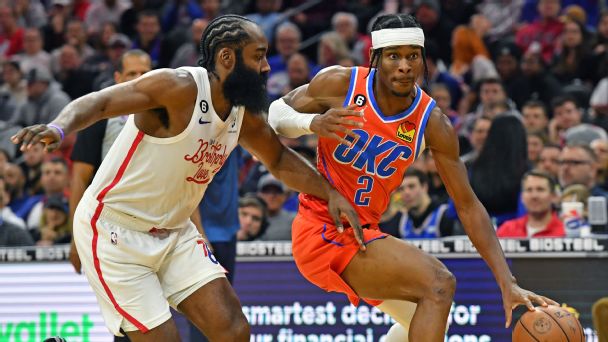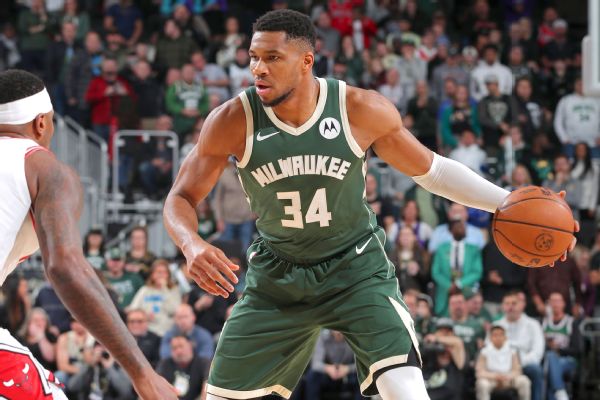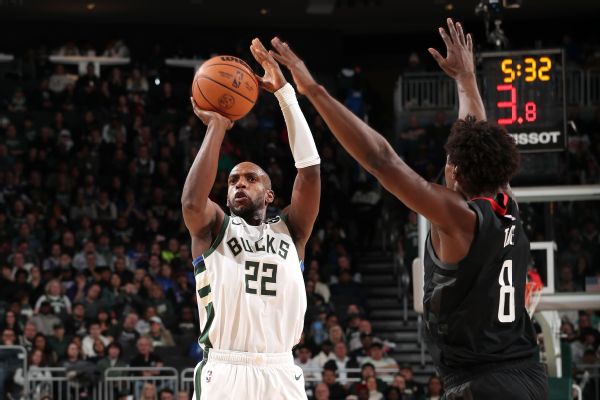What lies ahead for some of the biggest risers and fallers in NBArank 2023?
On Tuesday, our countdown began with the unveiling of players Nos. 100-51, while Wednesday continued with Nos. 50-11. (The top 10 drops on Thursday.)
Among our first 90 player rankings, there have been plenty of movement. Guard Jamal Murray rose 33 spots after helping lead the Denver Nuggets to the title and Sacramento Kings teammates Domantas Sabonis and De’Aaron Fox saw massive jumps. Meanwhile, stars such as Milwaukee Bucks forward Khris Middleton and New Orleans Pelicans forward Zion Williamson dropped due to injury-filled 2022-23 campaigns.
But none of those players matched the wild swings — both up and down our list — from the players below, starring a former MVP with an uncertain future, a three-time Defensive Player of the Year still figuring out his new team and a young guard who has vaulted into elite territory.
Our NBA Insiders break down the top four risers and fallers inside the 2023 NBArank countdown.
FOUR UP
![]() Shai Gilgeous-Alexander, Oklahoma City Thunder
Shai Gilgeous-Alexander, Oklahoma City Thunder
NBArank: Top 10 (No. 48 last season)
The 2022-23 campaign was truly a breakout for SGA, who turned himself into a household name by averaging over 31.4 points per game, making his first All-Star appearance and earning his first All-NBA selection, jumping straight onto the first team. Gilgeous-Alexander followed that by leading Team Canada to a bronze medal with a win over Team USA at the FIBA World Cup last month.
Now, he will be hoping to power the young Thunder back to the playoffs for the first time since the NBA’s bubble season in 2020. Despite being a team so reliant on youth, he might just be good enough to do it.
If Gilgeous-Alexander is going to make yet another leap up this list, however, it’s going to require him to at least begin filling the one remaining hole in his game: his lack of a consistent 3-point shot. Not only did he shoot 34.5% from deep last season, but he did so on just 2.5 attempts per game, both far below the norm for high-level guards. If Gilgeous-Alexander can combine his two-way ability and his lights-out midrange game with improved shooting from deep, he could become virtually unstoppable.
— Tim Bontemps
![]() Lauri Markkanen, Utah Jazz
Lauri Markkanen, Utah Jazz
NBArank: 28 (Not ranked last season)
The draft capital coming from Cleveland, not Markkanen, was considered the headliner of Utah’s return in the Donovan Mitchell deal. The perception of Markkanen, a former No. 7 overall pick who the Chicago Bulls willingly let leave in a sign-and-trade deal the previous summer, was that he was a solid player whose $16.5 million salary was critical in making the trade math work. Five years into his career, terms like upside and potential didn’t come up in conversations about Markkanen.
But Markkanen morphed into an All-Star during his first season in Utah, seizing opportunities to show that he was much more than the 7-foot spot-up shooter of his previous NBA stops. It started with his spectacular EuroBasket run for the Finland national team, when Markkanen excelled as the primary offensive threat, scoring in ways that Jazz coach Will Hardy hadn’t seen from him in the NBA. Hardy, a rookie head coach for a rebuilding team, entered last season with an open mind and a determination to allow Markkanen to prove what he could do instead of assumptions about what he couldn’t.
Markkanen responded by averaging an efficient 25.6 points per game, earning an All-Star spot and the league’s Most Improved Player award.
“I don’t know what the ceiling is on Lauri,” Hardy said at the end of last season. “I don’t think any of us do, but I’m pretty sure we haven’t seen it yet.”
— Tim MacMahon
![]() Paolo Banchero, Orlando Magic
Paolo Banchero, Orlando Magic
NBArank: 30 (No. 82 last season)
It seems like a distant memory that the Magic debated in the lead-up to the 2022 draft about whether they should make Banchero the No.1 overall pick. From the first game of his NBA career, when he became the first rookie to debut with a 25-5-5 stat line since LeBron James, Banchero put those doubts to rest. From there, Banchero ran away with the Rookie of the Year award, averaging 20 points and 6.9 rebounds for Orlando, shutting down any doubts about him being the top selection and giving Magic fans a reason for optimism for the future. Banchero’s size (6-10, 250 pounds), playmaking and scoring ability translated to the NBA immediately, and how much Banchero can continue to evolve will define the ceiling for this young team. If he follows other recent rookie 20-point scorers — such as Joel Embiid, Luka Doncic or Zion Williamson — and takes a leap to All-Star level in his second season, the Magic could start envisioning a postseason berth for the first time since the 2019-20 season. Then, Banchero could continue climbing this list as one of the most promising young players in the league.
— Jamal Collier
![]() Franz Wagner, Orlando Magic
Franz Wagner, Orlando Magic
NBArank: 52 (Not ranked last season)
Heading into last season, Wagner was coming off of a strong EuroBasket showing where he averaged 15.2 points across the competition. That turned into a standout sophomore campaign where he upped his scoring, field goal and 3-point percentages and assists and steals averages. Wagner was a key component in the Magic bouncing back from a 5-20 start to finish 29-28 and spreading optimism throughout the organization heading into 2023-24.
Wagner is again coming off a strong performance for Germany as he helped lead his squad to the FIBA World Cup championship. Now, he’ll try and build upon that performance once again.
The respect shown to both Wagner and Banchero in the rankings exhibits how our panel feels about the prospects of the Magic this season. In our win-loss projections from August, the Magic were picked to finish 38-44 this season, good enough to place them in the Eastern Conference’s play-in tournament.
If Wagner can build on his summer performance this offseason like he did previously, there’s nothing stopping him from joining Banchero in the top third in next year’s NBArank.
— Andrew Lopez
FOUR DOWN
![]() Chris Paul, Golden State Warriors
Chris Paul, Golden State Warriors
NBArank: 76 (No. 21 last season)
In 2021-22, Paul showed he was still a force at point guard, averaging 14.7 points and a league-leading 10.8 assists per game at 36 years old. With the Suns just a season removed from a Finals appearance, there was reason to be high on what Paul could still do on the court.
However, last year represented a step back. He played in just 59 games, shot 44.0% overall and watched his 2-point percentage dip to 48.2%. He didn’t look like the same player but was still good enough to contribute at a high level.
But it won’t be in Phoenix; Paul was dealt from the Valley of the Sun to Washington in the Bradley Beal deal but was flipped to Golden State for Jordan Poole.
Paul took a 55-spot drop in this year’s rankings in part because his role has become unclear entering this season. Will the Warriors go super small with Paul, Stephen Curry, Klay Thompson, Andrew Wiggins and Draymond Green in the starting lineup?
Paul has never come off the bench in 1,214 career NBA games, but during media day earlier this month, he was quick to point out he came off the bench in the 2008 Olympics.
“I think anybody who knows me knows I’m all about winning,” Paul said. “Whatever I can do to help our team win.”
In the Warriors’ first preseason game, Paul did start, although Green did not play.
Whatever role Paul finds himself in — remaining a starter or becoming a Sixth Man of the Year candidate — if he plays at the level he’s capable, he’ll be an asset to the Warriors title hopes and jump back near the top half of our countdown.
— Lopez
![]() Cade Cunningham, Detroit Pistons
Cade Cunningham, Detroit Pistons
NBArank: 74 (No. 35 last season)
Cunningham’s second season in the NBA never really got underway.
He was limited to 12 games before a stress fracture in his left leg ended his season, leading to his freefall in this year’s rankings. But 11 months after Cunningham last played in an NBA game, the Pistons’ No.1 pick seems poised for a bounce-back season — as long as he can stay on the floor.
Cunningham was impressive during his stint for the USA Select Team over the summer, drawing praise from Team USA coach Steve Kerr, who said Cunningham looked healthy and could control the game from the point guard spot with his physicality. At 6-foot-6 and 220 pounds, Cunningham has a unique combination of size and strength that made him a sub for Luka Doncic as the national team prepared over the summer.
Before his injury, Cunningham was averaging 19.9 points, 6.2 rebounds and 6.0 assists. If he can continue to hone those all-around skills, improve his shooting and find the right mix of passing and scoring aggressiveness, the Pistons should find much more success after finishing with the NBA’s worst record.
— Collier
![]() Rudy Gobert, Minnesota Timberwolves
Rudy Gobert, Minnesota Timberwolves
NBArank: 64 (No. 18 last season)
The exorbitant price the Timberwolves paid in the trade to get Gobert ensured that he arrived in Minnesota under immense pressure. His first season fell far short of justifying the cost of the blockbuster deal with the Jazz, who received four future first-round picks, a pair of role players and Walker Kessler, who proceeded to become a first-team All-Rookie selection.
Gobert’s numbers slipped significantly during his first season in Minnesota. His scoring average (13.4 points per game) was his lowest since 2015-16, his first season as a starter. He averaged a respectable 11.6 rebounds per game, but that was a six-year low. The three-time Defensive Player of the Year didn’t live up to his reputation as an elite rim protector either, averaging only 1.4 blocks per game, his fewest since he was sparingly used as a rookie in Utah. The analytics that measure impact — numbers that had ranked Gobert among the league’s elite for years — were all down as well.
There were other legitimate reasons for Gobert’s drop-off. He reported to training camp with knee soreness, which he suffered playing for France in EuroBasket and lingered into the season. He struggled adapting to new teammates and a new system, and injuries to teammates, particularly Karl-Anthony Towns’ serious calf strain, disrupted efforts to develop chemistry and continuity.
— MacMahon
![]() James Harden, Philadelphia 76ers
James Harden, Philadelphia 76ers
NBArank: 43 (No. 11 last season)
In many ways, Harden was still a hugely effective player in 2022-23. He led the league in assists for the second time in his career and his pick-and-roll partnership with Joel Embiid was otherworldly, as he helped Embiid win a second straight scoring title and capture his first MVP.
Harden had some breathtaking playoff performances, including his 45-point showing in Game 1 of the East semifinals against the Boston Celtics with Embiid sidelined.
But Harden’s game showed slippage. He became far more reliant on midrange jumpers than he had over the prior decade, when he became synonymous with the analytically-friendly approach of going for layups, free throws and 3-pointers and eschewing other shots. But Harden lacked the same sort of burst, causing him to struggle to get by defenders and to the rim.
While Harden is still a very valuable player, even as he’s entering his mid-30s, the biggest reason for his 32-spot drop centers around where he’ll be playing. He’s made it clear he doesn’t want to be in Philadelphia anymore, and has requested a trade away from the 76ers. The team hasn’t granted it, and a deal doesn’t seem likely anytime soon. So how Harden will react, and what it will mean for the 76ers, is the dominant storyline of his, and Philadelphia’s season.
— Bontemps


